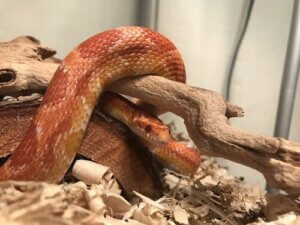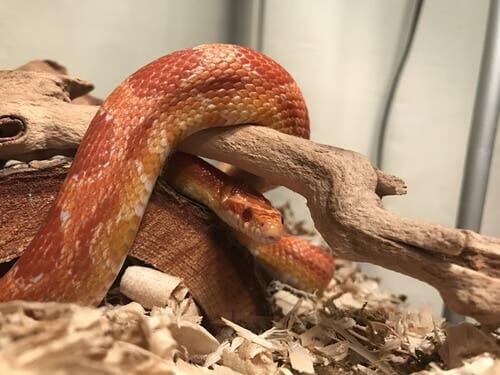Caring For Snakes as Pets

If you plan to bring home a reptile as a pet, you need to be aware of certain needs that are different from other more conventional pets, such as dogs or cats. In this article, we’ll tell you about how to care for snakes as pets at home.
Caring for snakes as pets
Firstly, you need to pick a species of snake that’s easy to handle and not dangerous. We recommend that you consult a veterinarian or reptile expert before purchasing a snake.
Always remember that snakes are wild animals. As a result, they can act unexpectedly if they feel threatened. In fact, they can also react badly if they don’t get the right treatment.

It’s very important that you consult a professional to make sure that your snake is able to survive in captivity. Some species may have habitual health problems from living outside their natural habitats. These problems could include parasite infections, lack of vitamins, stress, dehydration, or burns.
Tips for caring for snakes as pets in your home
Habitat and food are two issues that you need to focus on to keep your pet snake healthy and happy. One of the main problems that snakes deal with in captivity is that they don’t get enough food or that their habitat doesn’t have everything they need. We’ll give you some tips.
1. Terrariums
This is what professionals refer to as the habitat for snakes as pets. These tanks must be spacious and have lots of space horizontally. In addition, they need good ventilation and a well-fixed grid top to prevent the reptile from escaping. You definitely don’t want a snake escaping, as they can become aggressive.
At the bottom of the terrarium, spread a special material made of gravel, hay, or moss. You can purchase this material in a pet store. This layer also needs to be changed periodically. You need to make sure that it’s always clean and dry.

Then, on top of the base layer, you should add a branch or stone. This allows the snake to get some exercise. They will move over these features just as they would in nature.
In addition, you can also put in a shelter or cave. This gives the animal some privacy and a place to hide if they want.
Also, keep in mind that snakes are cold-blooded. Their bodies can’t control the temperature on their own. In fact, reptiles need something external to warm themselves. Besides placing the terrarium in a sunny place, you should also get a special light or heater that keeps the temperature between 77 degrees and 104 degrees Fahrenheit.
You should use a thermometer to check the temperature in the terrarium. Remember, at night you’ll need to lower the temperature just as it gets colder at night in their natural habitat. This will allow the snake to sleep as it simulates its natural habitat.
2. Molting
Keep in mind that during molting season, snakes will lose their skin. However, during this time they don’t eat anything. Avoid giving them food. Above all, don’t disturb them or go near them. They use significant energy during this process and can become aggressive if disturbed.

We recommend that you give your snake stones or branches with rough surfaces. These will help them remove dead skin. Once your snake has completely shed its skin, it may actually eat it.
3. Food
When caring for snakes as pets, you need to consider not just what they eat, but also how they eat.
We recommend, for example, that you create a special place in the terrarium where you place food. That way, your snake will differentiate their “living area” from their “kitchen.”

Some snake owners give their pets rats, mice, fish, worms, or live birds to feed on. However, this can be unpleasant to watch.
As a result, in specialized stores, you can find “prepared” food for reptiles. This will prevent you from having to watch your snake eating live food.
Generally, snakes eat once a week or every 15 days. They have a slow metabolism and can remain satisfied for several days without needing to eat. Also, don’t forget to leave a container with clean, fresh water.
If you plan to bring home a reptile as a pet, you need to be aware of certain needs that are different from other more conventional pets, such as dogs or cats. In this article, we’ll tell you about how to care for snakes as pets at home.
Caring for snakes as pets
Firstly, you need to pick a species of snake that’s easy to handle and not dangerous. We recommend that you consult a veterinarian or reptile expert before purchasing a snake.
Always remember that snakes are wild animals. As a result, they can act unexpectedly if they feel threatened. In fact, they can also react badly if they don’t get the right treatment.

It’s very important that you consult a professional to make sure that your snake is able to survive in captivity. Some species may have habitual health problems from living outside their natural habitats. These problems could include parasite infections, lack of vitamins, stress, dehydration, or burns.
Tips for caring for snakes as pets in your home
Habitat and food are two issues that you need to focus on to keep your pet snake healthy and happy. One of the main problems that snakes deal with in captivity is that they don’t get enough food or that their habitat doesn’t have everything they need. We’ll give you some tips.
1. Terrariums
This is what professionals refer to as the habitat for snakes as pets. These tanks must be spacious and have lots of space horizontally. In addition, they need good ventilation and a well-fixed grid top to prevent the reptile from escaping. You definitely don’t want a snake escaping, as they can become aggressive.
At the bottom of the terrarium, spread a special material made of gravel, hay, or moss. You can purchase this material in a pet store. This layer also needs to be changed periodically. You need to make sure that it’s always clean and dry.

Then, on top of the base layer, you should add a branch or stone. This allows the snake to get some exercise. They will move over these features just as they would in nature.
In addition, you can also put in a shelter or cave. This gives the animal some privacy and a place to hide if they want.
Also, keep in mind that snakes are cold-blooded. Their bodies can’t control the temperature on their own. In fact, reptiles need something external to warm themselves. Besides placing the terrarium in a sunny place, you should also get a special light or heater that keeps the temperature between 77 degrees and 104 degrees Fahrenheit.
You should use a thermometer to check the temperature in the terrarium. Remember, at night you’ll need to lower the temperature just as it gets colder at night in their natural habitat. This will allow the snake to sleep as it simulates its natural habitat.
2. Molting
Keep in mind that during molting season, snakes will lose their skin. However, during this time they don’t eat anything. Avoid giving them food. Above all, don’t disturb them or go near them. They use significant energy during this process and can become aggressive if disturbed.

We recommend that you give your snake stones or branches with rough surfaces. These will help them remove dead skin. Once your snake has completely shed its skin, it may actually eat it.
3. Food
When caring for snakes as pets, you need to consider not just what they eat, but also how they eat.
We recommend, for example, that you create a special place in the terrarium where you place food. That way, your snake will differentiate their “living area” from their “kitchen.”

Some snake owners give their pets rats, mice, fish, worms, or live birds to feed on. However, this can be unpleasant to watch.
As a result, in specialized stores, you can find “prepared” food for reptiles. This will prevent you from having to watch your snake eating live food.
Generally, snakes eat once a week or every 15 days. They have a slow metabolism and can remain satisfied for several days without needing to eat. Also, don’t forget to leave a container with clean, fresh water.
This text is provided for informational purposes only and does not replace consultation with a professional. If in doubt, consult your specialist.








